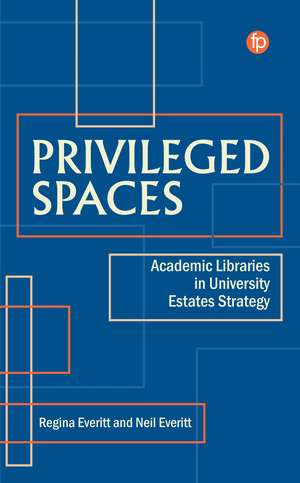Privileged Spaces: Academic Libraries in University Estates Strategy
Editat de Regina Everitt, Neil Everitten Limba Engleză Paperback – 15 dec 2024
Library staff and leaders in particular will gain practical intelligence to advocating for library spaces.
Preț: 442.33 lei
Preț vechi: 546.09 lei
-19% Nou
Puncte Express: 663
Preț estimativ în valută:
84.71€ • 87.28$ • 70.96£
84.71€ • 87.28$ • 70.96£
Carte disponibilă
Livrare economică 03-17 februarie
Livrare express 17-23 ianuarie pentru 25.74 lei
Preluare comenzi: 021 569.72.76
Specificații
ISBN-13: 9781783306466
ISBN-10: 1783306467
Pagini: 256
Dimensiuni: 156 x 234 x 11 mm
Ediția:1
Editura: Facet Publishing
Colecția Facet Publishing
ISBN-10: 1783306467
Pagini: 256
Dimensiuni: 156 x 234 x 11 mm
Ediția:1
Editura: Facet Publishing
Colecția Facet Publishing
Public țintă
Professional ReferenceCuprins
Part I Foundations 1. Estates and Facilites with Libraries: working together to deliver university strategy 2. Academic libraries and estates strategy: a library leadership perspective 3. The university library as estates asset: tools for negotiating space in an evolving strategy 4. A practical guide to writing a successful business case to influence university estates strategy 5. The role of academic libraries in 'selling' the university 6. The library through a workplace lens Part II Landings 7. Repurposing library study space to create a family room: a case study at University of Bradford 8. Politics, persuasion, and persistence: the learning commons project at University of Galway 9. The University of Northampton Waterside Campus 10. 10. Social and informal learning spaces and inclusion In Summary: The privilege of working in partnership Index
Notă biografică
Regina Everitt is Assistant Chief Operating Officer (ACOO) & Director of Library, Archives and Learning Services at the University of East London. She began her professional career as a technical author/trainer working with computer companies that developed software for the manufacturing, pharmaceutical and financial sectors in the US and UK. After managing a small library at a university in West Africa as a volunteer with the United States Peace Corps, she transitioned into the HE sector developing and managing libraries, social learning spaces, and other learning resources. Concerned about the low representation of Global Ethnic Majority (GEM) staff members in leadership positions in academic libraries, she co-project managed SCONUL research to document GEM staff experiences in library and information sciences (LIS) and is working with the sector to implement the recommendations from the report to develop more diverse talent. She is a member of the SCONUL Board, the British Library Advisory Council, and a member of a CILIP trailblazer group that is developing a standard for a Level 6/7 apprenticeship. She co-edited Narrative Expansions: Interpreting Decolonisation in Academic Libraries which considers how academic libraries are navigating this contentious topic.
Neil Everitt is Director of Strategic Engagement at the Institute of Workplace and Facilities Management (IWFM). Before joining IWFM he developed an interest in property after completing a volunteer procurement project for a charity providing community-based services in London. Prior to that he fulfilled a number of sales & marketing, procurement and change management roles, in several countries, with a large multi-national mining organisation.
.
Neil Everitt is Director of Strategic Engagement at the Institute of Workplace and Facilities Management (IWFM). Before joining IWFM he developed an interest in property after completing a volunteer procurement project for a charity providing community-based services in London. Prior to that he fulfilled a number of sales & marketing, procurement and change management roles, in several countries, with a large multi-national mining organisation.
.
Descriere
Drawing on the knowledge and experience of library leaders, estates directors, space managers, and researchers both nationally and internationally, Privileged Spaces provides insight into emerging thinking about the place of the academic library within university estates strategy.
